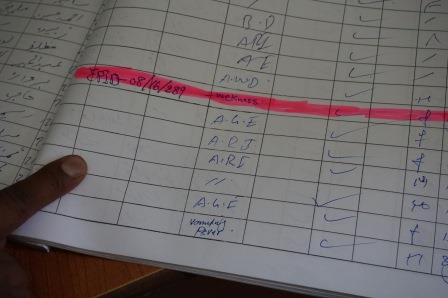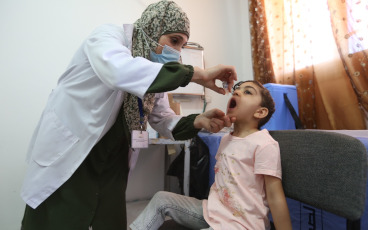Finding Every Last Virus in Afghanistan
Significant progress in strengthening polio surveillance has been seen in the last year in Afghanistan according to a recent review.
The Afghanistan polio surveillance review that took place in June commended the progress made in achieving strong surveillance networks throughout the country.
Afghanistan constitutes part of the final frontier in the fight to eradicate polio, as one of two remaining polio endemic countries alongside neighbouring Pakistan. Surveillance is key to eradication efforts: it is not just vaccinating every last child but being able to trace every last virus that will take us over the finishing line.
Highly sensitive surveillance is more important now than ever, as wild poliovirus transmission drops to very low levels – six cases have been reported through the surveillance system in Afghanistan in 2016. Strong surveillance enables the Global Polio Eradication Initiative to quickly identify outbreaks and helps guide a targeted, rapid outbreak response.
Strengthening Surveillance in Afghanistan
An external review of the Acute Flaccid Paralysis (AFP) surveillance system for polio eradication was conducted from 19 – 24 June 2016 in the eastern, southern, central and western regions of Afghanistan. Review teams consisted of polio eradication experts from WHO, UNICEF and Bill & Melinda Gates Foundation, facilitated by in-country staff from the Ministry of Public Health, WHO and UNICEF country teams. The review teams assessed surveillance records, health facilities, surveillance activities and the quality of case investigation.
A Strong Framework
The review concluded that surveillance in Afghanistan is strong and the circulation of wild poliovirus is unlikely to be missed. The network of sentinel sites to detect and report cases of ‘acute flaccid paralysis’ (AFP – the lead symptom of paralytic polio) was deemed appropriate, with adequate documentation of AFP data and excellent ongoing data analysis.
In their summary conclusions and recommendations, the review team emphasised the vital role played by health professionals and volunteers across the country both for polio immunisation efforts and in maintaining effective surveillance for AFP cases. Review teams found evidence for high levels of awareness of the concept and practice of AFP surveillance among health workers in the country. Both key indicators of AFP surveillance quality – the annual rate of reporting of AFP among children aged under 15, and the percentage of AFP cases for whom adequate stool specimens for lab analysis are taken – were found to meet international standards in all visited Regions. In addition to surveillance for AFP, the country also maintains a system of regular environmental surveillance, with collection and lab analysis of sewage samples, to further increase the sensitivity of surveillance in critical areas.

Admission log books are used by active surveillance workers to scan for patients having symptoms of acute flaccid paralysis (WHO/R.Tangermann)
Looking Forward
While commending the Government of Afghanistan and partners for their work in securing progress in the last year, the review team also provided some recommendations to further strengthen the surveillance system.
To ensure that all avenues are explored to detect the presence of polioviruses, the review recommended that private health facilities must be further integrated in the AFP surveillance system. This will improve the programme’s ability to find children with paralysis, regardless of their background. The review also highlighted the importance of comprehensive training for surveillance staff, emphasising the need to utilise existing hospital infrastructure to spread awareness about concepts and practice of AFP surveillance.
Further progress towards interrupting poliovirus transmission in Afghanistan requires that even more children are reached and vaccinated against polio, and that the quality and sensitivity of surveillance for poliovirus remains strong and is further improved. A sustained focus on improving surveillance efforts remains paramount to eradication.
The external AFP review team commended overall surveillance efforts of the Ministry of Public Health and partners. The Global Polio Eradication Initiative would like to thank Rotary International, USAID, and the Canadian and German governments for their continued support in the fight to eradicate polio in Afghanistan. Bolstering and extending surveillance networks across the country is essential in order to secure a polio-free future in Afghanistan.
An external review of the Acute Flaccid Paralysis (AFP) surveillance system for polio eradication was conducted from 19 – 24 June 2016 in the eastern, southern, central and western regions of Afghanistan. Review teams consisted of polio eradication experts from WHO, UNICEF and Bill & Melinda Gates Foundation, facilitated by in-country staff from the Ministry of Public Health and from WHO and UNICEF country teams. The review teams assessed surveillance records, health facilities, surveillance activities and the quality of case investigation.
A Strong Framework
The review concluded that surveillance in Afghanistan is strong and the circulation of wild poliovirus is unlikely to be missed. The network of sentinel sites to detect and report cases of ‘acute flaccid paralysis’ (AFP – the lead symptom of paralytic polio) was deemed appropriate, with adequate documentation of AFP data and excellent ongoing data analysis.
In their summary conclusions and recommendations, the review team emphasised the vital role played by health professionals and volunteers across the country both for polio immunisation efforts and in maintaining effective surveillance for AFP cases. Review teams found evidence for high levels of awareness of the concept and practice of AFP surveillance among health workers in the country. Both key indicators of AFP surveillance quality – the annual rate of reporting of AFP among children aged under 15, and the percentage of AFP cases for whom adequate stool specimens for lab analysis are taken – were found to meet international standards in all visited Regions. In addition to surveillance for AFP, the country also maintains a system of regular environmental surveillance, with collection and lab analysis of sewage samples, to further increase the sensitivity of surveillance in critical areas.

Admission log books are used by active surveillance workers to scan for patients having symptoms of acute flaccid paralysis (WHO/R.Tangermann)
While commending the Government of Afghanistan and partners for their work in securing progress in the last year, the review team also provided some recommendations to further strengthen the surveillance system.
To ensure that all avenues are explored to detect the presence of polioviruses, the review recommended that private health facilities must be further integrated in the AFP surveillance system. This will improve the programme’s ability to find children with paralysis, regardless of their background. The review also highlighted the importance of comprehensive training for surveillance staff, emphasising the need to utilise existing hospital infrastructure to spread awareness about concepts and practice of AFP surveillance.
Further progress towards interrupting poliovirus transmission in Afghanistan requires that even more children are reached and vaccinated against polio, and that the quality and sensitivity of surveillance for poliovirus remains strong and is further improved. A sustained focus on improving surveillance efforts remains paramount to eradication.
The external AFP review team commended overall surveillance efforts of the Ministry of Public Health and partners. The Global Polio Eradication Initiative would like to thank Rotary International, USAID, and the Canadian and German governments for their continued support in the fight to eradicate polio in Afghanistan. Bolstering and extending surveillance networks across the country is essential in order to secure a polio-free future in Afghanistan.












